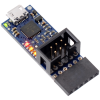Pololu USB AVR Programmer v2.1
In stock, ships same business day if ordered before 2PM
Fastest delivery: Tomorrow*
Disclaimer:
For next-day delivery, the shipping address must
be in the AusPost next-day network, eParcel Express must be selected, and the order must be placed
before 2PM AEST Mon-Thurs excluding NSW Public Holidays. Orders may be delayed due to AusPost
pickup timings and order verifications. eParcel Express is typically a 1-day service within the
AusPost next-day network, though it is sometimes 2+ days.
Quantity Discounts:
- 10+ $21.91 (exc GST)
- 25+ $21.22 (exc GST)
 |
|
The Pololu USB AVR Programmer v2 (bottom) connected to an A-Star 32U4 Prime SV for programming. |
|---|
The Pololu USB AVR Programmer v2.1 is a compact, low-cost in-system programmer (ISP) for AVR microcontrollers from Atmel (now a part of Microchip). The programmer provides an interface for transferring a compiled AVR program from your computer to the target AVR’s non-volatile memory, allowing it to run the program. It is a good solution for programming AVR-based controllers like Pololu's A-Star 328PB Micro and Orangutan robot controllers. It can also be used to update, replace, or remove the bootloader on some Arduino boards including the Uno, Leonardo, and Mega, and also on Pololu's Arduino-compatible A-Star controllers. This programmer is designed to work well with both 3.3 V and 5 V devices, and it can even be configured to provide power to the target device in low-power systems.
The programmer connects to your computer’s USB port via a standard USB A to Micro-B cable (not included) and communicates with your programming software, such as Microchip Studio, AVRDUDE, or the Arduino IDE, through a virtual COM port using the STK500 protocol. The programmer connects to your target device via an included 6-pin ISP programming cable (the older, 10-pin ISP connections are not directly supported, but it’s easy to create or purchase a 6-pin-to-10-pin ISP adapter). The programmer also acts as a USB-to-TTL serial adapter, providing a TTL-level serial port that can be used to communicate with other serial devices from your computer. It ships fully assembled with connectors soldered in as shown.
The Pololu USB AVR Programmer v2.1 is a drop-in replacement for the older Pololu USB AVR Programmer v2 with several hardware improvements that are described in the “Comparison to previous AVR programmers” section below.
This product requires a USB A to Micro-B cable to connect to a computer.
 |
 |
Features and specifications
- Connects to a computer through USB via a USB A to Micro-B cable (not included)
- Emulates an STK500 programmer through virtual COM port interface
- Works with standard AVR programming software, including Microchip Studio, AVRDUDE, and the Arduino IDE
- Configuration software available for Windows, Mac OS X, and Linux
- Supports both 3.3 V and 5 V devices; can automatically switch operating voltage based on detected target VCC
- Can optionally power the target at 3.3 V or 5 V in low-power systems
- USB-to-TTL serial adapter functionality for general-purpose serial communication
- Provides a 100 kHz clock output, which can be useful for reviving misconfigured AVRs
- All I/O pins are protected with 470 O resistors
- 6-pin ISP cable and a 1×6 double-sided male header included
- Comprehensive user’s guide
Supported AVR microcontrollers
The programmer should work with all AVRs that can be programmed with the AVR ISP (in-system programming) interface, which is also known as in-circuit serial programming (ICSP), serial programming, or serial downloading, but it has not been tested with all devices. Pololu expect it to work with most AVRs in the megaAVR (ATmega) family, and it works with some members of the tinyAVR (ATtiny) family, but it does not support the Tiny Programming Interface (TPI), and it does not work with the XMEGA family or with 32-bit AVRs. The programmer features upgradable firmware, allowing updates for future devices.
The programmer is designed for use with AVR microcontrollers running at either 3.3 V or 5 V. By default, the programmer expects the target to be self-powered, but it can be configured to deliver power to the target device in low-power systems.
Supported operating systems
Pololu support using the Pololu USB AVR Programmer v2.1 and its configuration software on desktop versions of Windows (7, 8, 10, and 11), Linux, and macOS 10.11 or later. Older versions of Windows are not supported.
 |
|
The Pololu USB AVR Programmer v2 (top) connected to an Adafruit Pro Trinket for programming. |
|---|
Bonus feature: TTL-level serial port
This programmer doubles as a USB-to-serial adapter. The programmer installs as two virtual COM ports: one for communicating with programming software and one for general-purpose serial communications. This means that you can seamlessly switch between programming an AVR and debugging it through the TTL serial port without having to open and close your terminal program. In addition to the serial transmit (TX) and receive (RX) lines, the programmer lets you use A and B as serial handshaking lines that can be configured using Pololu's software.
The six pins on the serial header (GND, A, VCC, TX, RX, and B) are arranged to be similar to the pinout of commonly-available FTDI USB-to-serial cables and breakout boards. In the default configuration, pin B is used as the DTR output (and pin A is an unused input), which allows you to plug the programmer directly into a variety of Arduino-compatible boards (including Pololu's A-Star 328PB Micro) and use it to upload programs to the board via a serial bootloader.
Included accessories
The Pololu USB AVR Programmer v2.1 ships fully assembled with ISP and serial connectors soldered in, and it includes the accessories shown in the picture below. The 6-pin ISP cable can be used to program AVRs. The 1×6 double-sided male header can be plugged into the serial header to effectively reverse its gender (making it possible to connect that header to a breadboard or female jumper wires).
 |
|
Pololu USB AVR Programmer v2 or v2.1 with included hardware. |
|---|
 |
|
From left to right: the original Orangutan USB Programmer, the Pololu USB AVR Programmer, and the Pololu USB AVR Programmer v2 (which looks almost the same as v2.1). |
|---|
Comparison to previous AVR programmers
The Pololu USB AVR Programmer v2.1 (product #1372) is a drop-in replacement for Pololu's older Pololu USB AVR Programmer v2 (product #3170) with three hardware improvements:
- The optional VCC output feature of the v2 programmer (which allows you to power your AVR target from the programmer) was not designed to power loads with more than a few microfarads of capacitance. The v2.1 programmer has better VCC output circuity, so it can power higher-capacitance boards that would have caused the v2 programmer to continually experience brown-out resets. While there is still a limit to how much capacitance it can handle, Pololu expect the v2.1 VCC output feature to work with most small AVR target boards that have less than about 33 µF of capacitance on VCC, and Pololu have tested it with the A-Star 328PB Micro.
- Plugging a v2 programmer into a 3pi robot could cause one of the motors to briefly run at full speed because the programmer’s circuitry for measuring VCC could inadvertently pull up one of the 3pi’s programming pins (which doubles as a motor driver input) before the GND connection was established. The v2.1 programmer has improved circuitry for measuring VCC which limits the duty cycle of this effect to about 0.2%, so the motor won’t move (but it might make a 25 Hz clicking sound).
- The v2 programmer would typically brown-out if a 5 V signal was applied to its RST pin while it was operating at 3.3 V. The v2.1 programmer does not have this problem.
Compared to the original Pololu USB AVR Programmer (product #1300), the Pololu USB AVR Programmer v2.1 features a number of improvements:
- Support for devices operating at 3.3 V (in addition to 5 V)
- VCC pin can be configured to provide 3.3 V or 5 V power to target in low-power systems
- Protection resistors on all I/O lines
- More accurate emulation of the ISP frequencies provided by the STK500; you can use the user interfaces of Microchip Studio and AVRDUDE to set your ISP frequency more easily
- Usability enhancements for serial interface, such as a more standard pin arrangement (similar to FTDI) and a pre-populated female header
This v2.1 programmer does not include a USB cable, and it does not have the SLO-scope bonus feature. In addition to these changes, many other details are different between the v2.1 programmer and the original; please be sure to refer to the user’s guide for the v2.x programmers to familiarize yourself with this programmer.
People often buy this product together with:
 |
Thin (2mm) USB Cable A to Micro-B, 6 ft, Low/Full-Speed Only |
 |
A-Star 328PB Micro - 5V, 16MHz |
Identifying markings
| PCB dev codes: | pgm04b |
|---|---|
| Other PCB markings: | 0J11125 |
Documentation and other information
 |
Pololu USB AVR Programmer v2 User’s Guide (Printable PDF) | User’s manual for the Pololu USB AVR Programmer v2. |
 |
Pololu AVR Programming Quick Start Guide (Printable PDF) | This guide explains how to get started programming your Orangutan or 3pi Robot in Windows, Linux or Mac OS X. It covers setting up an AVR development environment (Atmel Studio for Windows users), installing the Pololu AVR C/C++ Library, and setting up the Pololu USB AVR Programmer. |
File downloads
-
Pololu USB AVR Programmer v2 Software and Drivers for Windows (9MB msi)
This installer contains the drivers and software for the Pololu USB AVR Programmer v2 for Microsoft Windows.
-
Pololu USB AVR Programmer v2 Software for Linux (x86) (8MB xz)
-
Pololu USB AVR Programmer v2 Software for Linux (Raspberry Pi) (6MB xz)
-
Pololu USB AVR Programmer v2 Software for Mac OS X (7MB pkg)
This installer contains the software for the Pololu USB AVR Programmer v2 for Mac OS X.
-
Pololu AVR Development Bundle for Windows (12MB exe)
This bundle contains all the Pololu software you need to get started programming AVRs in Windows: the Pololu AVR C/C++ Library, the Pololu USB AVR Programmer drivers and software, and the Pololu Orangutan SVP drivers. Pololu recommend installing Atmel Studio 7.0 before installing this bundle.
-
Dimension diagram of the Pololu USB AVR Programmer v2.1 (240k pdf)
-
Drill guide for the Pololu USB AVR Programmer v2.1 (39k dxf)
This DXF drawing shows the locations of all of the board’s holes.
Recommended links
-
Pololu USB AVR Programmer v2 software source code
Source code for the Pololu USB AVR Programmer v2 software on GitHub.
-
Microchip Studio for AVR and SAM Devices
A free integrated development environment (IDE) for AVRs. Formerly known as Atmel Studio.
-
A free, open-source suite of development tools for the AVR family of microcontrollers, including the GNU GCC compiler for C/C++.
-
Distribution of AVR development libraries and tools for Mac OS X.
-
AVRDUDE is a cross-platform command-line utility for programming the flash memory on AVR microcontrollers.
-
Arduino integrated development environment (IDE) software
-
The web site for AVR Libc, which is the standard library of functions that you can use with C and C++ on the AVR.
-
GCC, the GNU Compiler Collection
Documentation for GCC, including the AVR GCC C/C++ compilers.
-
Pololu Robotics and Electronics forum — get technical support, share your project, or just drop in to say hi.
-
AVR community with forums, projects, and AVR news.
Exact shipping can be calculated on the view cart page (no login required).
Products that weigh more than 0.5 KG may cost more than what's shown (for example, test equipment, machines, >500mL liquids, etc).
We deliver Australia-wide with these options (depends on the final destination - you can get a quote on the view cart page):
- $3+ for Stamped Mail (typically 10+ business days, not tracked, only available on selected small items)
- $7+ for Standard Post (typically 6+ business days, tracked)
- $11+ for Express Post (typically 2+ business days, tracked)
- Pickup - Free! Only available to customers who live in the Newcastle region (must order online and only pickup after we email to notify you the order is ready). Orders placed after 2PM may not be ready until the following business day.
Non-metro addresses in WA, NT, SA & TAS can take 2+ days in addition to the above information.
Some batteries (such as LiPo) can't be shipped by Air. During checkout, Express Post and International Methods will not be an option if you have that type of battery in your shopping cart.
International Orders - the following rates are for New Zealand and will vary for other countries:
- $12+ for Pack and Track (3+ days, tracked)
- $16+ for Express International (2-5 days, tracked)
If you order lots of gear, the postage amount will increase based on the weight of your order.
Our physical address (here's a PDF which includes other key business details):
40 Aruma Place
Cardiff
NSW, 2285
Australia
Take a look at our customer service page if you have other questions such as "do we do purchase orders" (yes!) or "are prices GST inclusive" (yes they are!). We're here to help - get in touch with us to talk shop.
Have a product question? We're here to help!
Guides
The Maker Revolution
Projects
Raspberry Pi Cyberdeck (SDR Edition)
Pico-Dog Motion Activated Audio Alarm
WaveJumper: Music Sample Slicer on a Breadboard
Makers love reviews as much as you do, please follow this link to review the products you have purchased.

















Product Comments